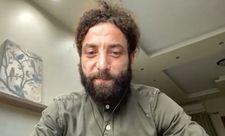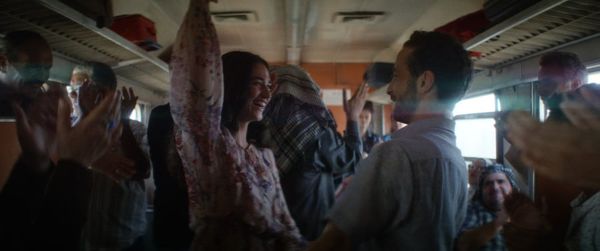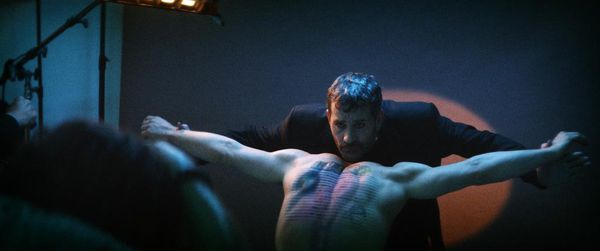Amber Wilkinson: This was a big role to take on as a kind of first feature. Were you just thrilled by the challenge of it or were you a bit daunted?
Yahya Mahayni: I was daunted first and foremost when I was approached to be the lead in this film, and I didn't know Kaouther Ben Hania's work just yet. So I tried to Google her and all this stuff. But then, more importantly, when I was called back for auditions, she sent me the links to almost all her films. As I watched them, I was like, “Wow, her expectations must be very high. This is an ambitious film. Do I have what it takes, etc?” And I won't lie to you, I was I was quite intimidated. And I tried to just contain exhibiting signs of that intimidation. But I was in good hands, because, Kaouther also knew that this was my first film, she knew that I didn't have the experience of preparing a lead role, which is in almost every single scene of the film but one. And she helped me in the process, and the other actors helped me, to including Dea Liane, who interprets Abeer. So, ultimately, I felt well surrounded, well supported and that I had to just focus on what I needed to do, to trust the director in her direction of your acting. And for her to tell you if you're doing something wrong, or if something needs adjustment.
 |
| Yahya Mahayni: 'The thing with acting that I try to remind myself, is that, first of all, it's still hard, regardless of how good you are' |
YM: I think it was emotionally tiring. The only aspect which was actually physically tiring, was lying down on my stomach for hours on end while a fake tattoo was placed on my back. But the actual interpretation of the character was more emotionally draining, I suppose, just getting into it. But I think, frankly, what was really tiring was the at the end of every day of filming, having this restlessness and anxiety, as a result of wondering whether what I did was satisfactory, you know, am I doing my job right? Are they happy? I learned to overcome that from the other actors who told me, “Listen, just do what you have to do, whatever is done is done and focus on the next day, and don't put too much pressure on yourself and go with the flow”. And ultimately, I think that was the advice I took and I tried to implement.
Here’s a funny anecdote, I tried to get, for example, into the habit of sitting down for protracted periods of time. Just like Tim Steiner actually does in museums where he sits. And I did that on one of the very first days of filming. There was a very big scene, you know, it was a reception where Sam is just exhibited on the top of a beautiful marble staircase. So all the scenes there were in the reception hall. I was like, “Listen, I want to actually sit there for however many hours it takes to help them, so that they look in the right place”. And so that I get into the skin of the character, no pun intended. I did that but then when the camera was on me, and it was my turn to say my lines, I was so wrecked. I couldn't even like annunciate my lines, my body was all over the place. And it just didn't work. Kaouther was like, “Have you been sitting there this whole time? Why did you do that?” I said: “To get into the character.” And she's said: “Don’t do that, again, it’s a very bad idea”. And so and so to make a long story short. So yeah, it was tiring but you have to bear in mind I was going back to a hotel room afterwards and chilling out.
AW: Obviously, the tattoo is a very important part of the film. That must have been quite meticulous to put on and take off. Did you have dummy runs with that before the film started to get the right technique?
YM: We did definitely have several dummy runs to try different versions of the tattoo. We were trying different versions, different sizes, black and white, colour. And then we realised that having a hirsute back is not necessarily conducive to the proper application of a fake tattoo. And so I had four laser sessions shaving it was problematic, because it causes acne. I'm getting into too much detail. I hope you're not about to have lunch.
 |
| Sam (Yahya Mahayni) and Abeer (Dea Liane). Mahayni: 'I could understand, from the perspective of someone who's madly in love, the decisions that this character was taking' Photo: Tanit Films |
AW: I suppose in a way, though, that would help you get into character to a degree because obviously in the film, that idea of this being property, a kind of commodity that has to be cared for, almost as though it's separate from the character of Sam himself, is a very integral part of the film. In a way your back, too, was a commodity for the film.
YM: Oh my gosh, tell me about it. I realised that, like, two days before we started filming, we went to where we were going to start the filming in the south of France in this magnificent Villa, which had access to a private beach that we weren't using. But you know, I'm like, you know, during one of the breaks, I'm like, “Okay, I'm just going go for a quick dip there”. And I went in there, and I cut my feet because there were stones underneath and I'm like, “Oh, my God, I’ve actually got to be careful what I do in my own private time”. Because imagine that that was a serious injury and everyone is dependent on the filming schedule. And then there was another break in the, in in the filming where we had like four days between shifting locations. So we went from France to Belgium, and there was a four-day break between that and I went back to home to where I live. And I was doing something stupid, I was just getting up and I scraped my back deeply against a piece of wood. And it scarred my back. And so the make-up artists had to deal with it for the rest of the whole film having to hide it each time. So yeah, I guess there are some parallels between Sam Ali and my actual back.
AW: As well as the sociopolitics of the film, I also like the fact that he's got this love story that runs through it. Was that something that attracted you to the role as well, the idea that it wasn't just about the politics that there is sort of human drama there,
YM: I think if it had it just been about the politics, I would have been much more reticent to do it. I’ve found it's nicer to do things which actually show the commonality between humans, rather than things which sow division, and in this sense, love does render you selfish, it does lead you to take crazy decisions, including that, perhaps, of selling your back. I could understand, from the perspective of someone who's madly in love, the decisions that this character was taking. And perhaps it's slightly fabulous in the literal sense, you know, it's somewhat of a tale, you know, he says it himself, “Listen, I need a horse, she’s with a monster”. His entire focus is on love. And despite the fact that he seems to have reached a dead end at one point, he still doesn't lose hope. I'm still looking forward to falling in love in the way that this character does in the story, but, but I think the fact that love story was in there made the motivation interesting.
AW: Could you also relate to the idea of living somewhere different from where you grew up?
YM: I emigrated with my family at quite a young age, first to France, then to Canada. And I always moved. I mean, I think I lived in about 9 or 10 different countries throughout my life. And I moved schools like, I don't know how many times also. And so, yeah, the feeling of home is quite malleable in my mind. But for Sam, home became secondary to the question of fulfilling this love.
AW: In terms of acting for you, you won a prize, this got Oscar nominated. I gather that before this you had more or less put acting away and sort of moved on. But now I presume it’s right back on the agenda?
Read what Kaouther Ben Hania had to say on The Man Who Sold His Skin, Alfred Hitchcock and François Truffaut.
- Read what Kaouther Ben Hania had to say on Beauty And The Dogs.
- Read what Kaouther Ben Hania said about Wim Delvoye and the Musée du Louvre, casting her film, working with extras, the eye of a child, Beauty And The Dogs, and Shirin Neshat.
- The Man Who Sold His Skin opens in the UK on September 24.























